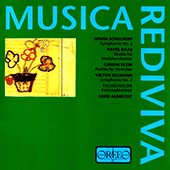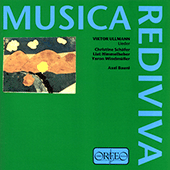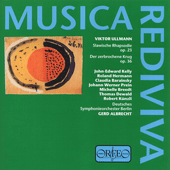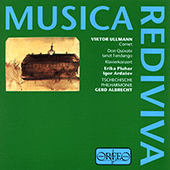
Viktor Ullmann (1898 - 1944)
Born into a Catholic family of Jewish origin, Viktor Ullmann studied in Vienna, where he was introduced into the circle of Schoenberg’s pupils, his literary interests embracing Karl Kraus, Wedekind, Heinrich Mann and others. In 1919 he moved to Prague, where he served as chorus répétiteur and conductor under Zemlinsky. He began to establish himself as a composer in the 1920s, working from 1929 to 1931 as director of music at the Zurich Schauspielhaus before moving to Stuttgart. In 1933 he returned to Prague, working as a freelance musician. He was deported to the concentration camp at Theresienstadt in 1942 and was killed in Auschwitz in 1944.
Operas and Theatre Music
In Theresienstadt Ullmann wrote his satirical opera Der Kaiser von Atlantis and began work on an opera, Jeanne d’Arc. His melodrama Die Weise von Liebe und Tod des Cornets Christoph Rilke (‘The Way of Love and Death of Cornet Christoph Rilke’) for speaker and orchestra was completed in 1944. Earlier stage works include the opera Peer Gynt.
Vocal Music
Ullmann set poems by Claudius, Kraus, Goethe, Novalis and others. His songs include his setting of Elizabeth Barrett Browning’s Sonnets from the Portuguese in a version by Rilke, as well as settings of Trakl, Hölderlin and Wedekind, and of Yiddish and Hebrew texts.
Instrumental Music
Ullmann’s instrumental music includes seven piano sonatas, the last three written in Theresienstadt, a Concerto for Orchestra, a Piano Concerto and Variations and a Double Fugue on a Theme by Arnold Schoenberg for string quartet.



















